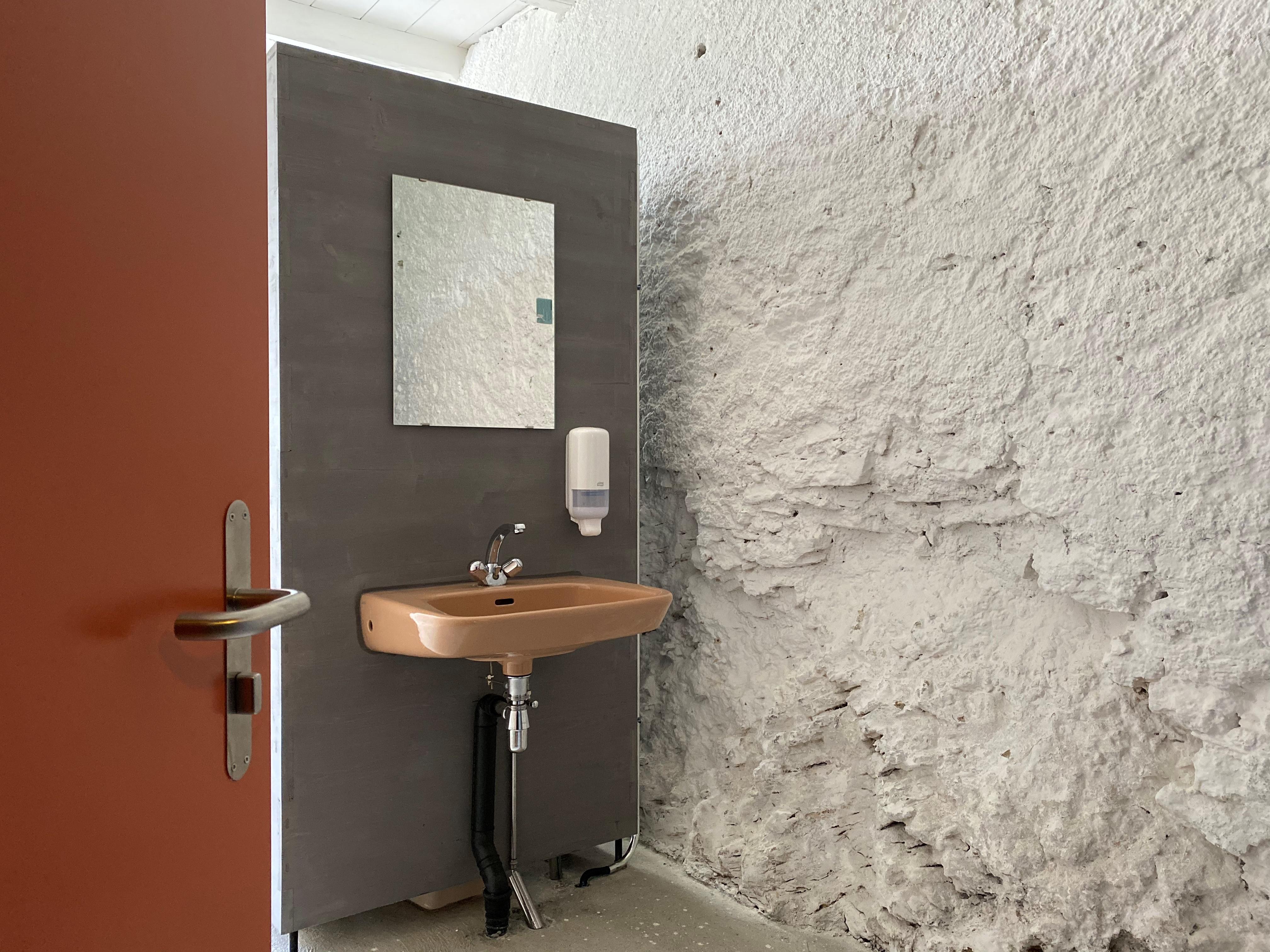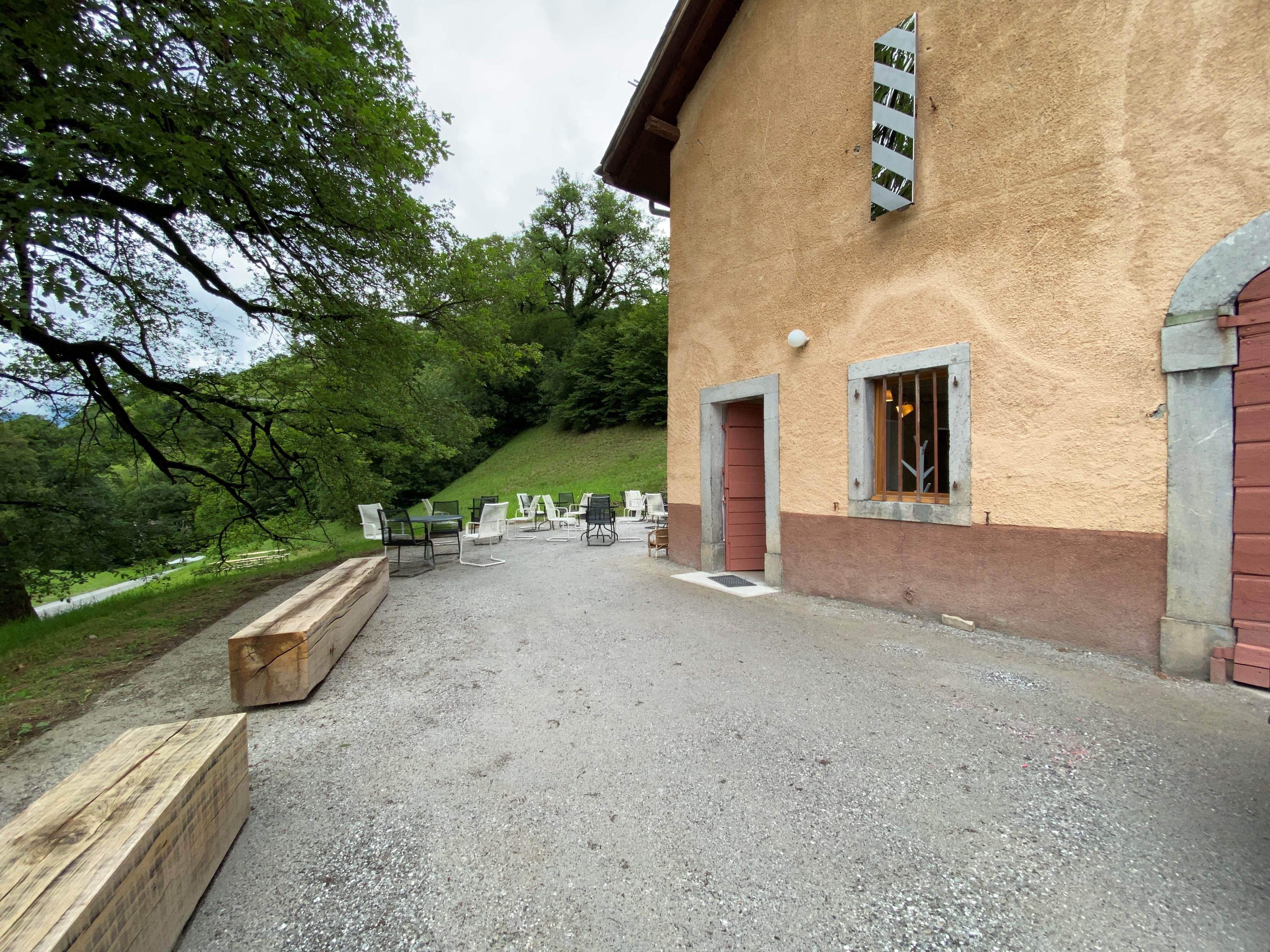Showcasing reuse principles at a tram depot and sculpture park

The lampshade made from recycled PET. © Tiago P. Borges
Students from EPFL’s EAST laboratory have installed recycled lights and restrooms at the Bex & Arts sculpture triennial – set to run from 22 June to 18 October – and repurposed parts of a disused tram depot in Bern. Both projects demonstrate the merits of using reclaimed materials.
Sinks straight out of the 1980s, doors and wall lights from the former EPFL daycare, and lampshades made from recycled plastic. These are just some of the sights that will greet visitors who drop in to the refreshment room at the 2020 Bex & Arts sculpture triennial. This outdoor exhibition, running from 22 June to 18 October, consists of monumental sculptures, installations and land art by around 30 artists. The reuse initiative, which aims to educate the public about the merits of using recycled materials in construction and design, is the brainchild of EPFL’s Laboratory of Elementary Architecture and Studies of Types (EAST). It ties in nicely with the theme of this year’s triennial: industrialization, the digital revolution and the climate emergency.

The bathroom stalls. © Tiago P. Borges
The project builds on a longstanding EPFL tradition. EAST laboratory co-directors Anja and Martin Fröhlich set architecture undergraduates an annual challenge: to design and build a full-scale pavilion using reclaimed materials from a demolished building and applying circular-economy principles. As in previous years (see links below), the students spent time considering the best way to give each part of the building a second lease on life. The idea behind the EPFL program is twofold: to give architecture students a chance to roll up their sleeves and get creative, while at the same time stressing the importance of environmentally friendly design.
From Bern to Bex
This year, the students spent the first semester renovating the former Burgernziel Alter tram depot in Bern. The prime contractor Losinger Marazzi granted EPFL access to the site and gave the students firsthand insights into the project’s aims, practical considerations and on-the-ground challenges.
In the second semester, the students set about designing structures using parts of the depot’s grandiose main hall, including the prefabricated steel frame and the original bricks that, despite their age, have retained their mechanical properties over time. Some of the reclaimed materials were used in a new teaching building at EPFL, featuring attractive and structurally solid brick pillars.
Other projects included a new type of greenhouse for the Geneva Botanical Gardens, where the bricks filter, store and radiate the sun’s heat, and a temporary structure in Thun with versatile facade modules that can be removed and used to reconfigure the interior. The students also designed a reclaimed material recycling center in Lausanne, with a curved, textured facade, and a plant pavilion for the Arboretum in Zurich, with vaulted ceilings that lend a distinctive quality to the internal space.
The Bachelor’s students were intending to take some of their ideas from the drawing board to the real world this spring. But then the coronavirus pandemic hit, and plans had to change. “This year has been a lesson in perseverance for all of us, teachers and students alike,” says Tiago P. Borges, a researcher at the EAST lab. “We had to put in place alternative plans without compromising on our values and our key message: the importance of transitioning to sustainable, responsible architecture.”
A redesigned refreshment room
Despite the uniquely challenging circumstances of this academic year, the EAST lab managed to arrange a parallel project: designing and fitting out a new refreshment room inside the barn at Parc de Szilassy, which is hosting the Bex & Arts triennial. The building is owned and managed by Vaud Canton’s Buildings and Heritage Department, which provided valuable support.
The students and researchers obtained sinks from Protravail, a charity that had reclaimed them from an abandoned villa in the canton, and recovered doors and wall lights from the former EPFL daycare center. Next they turned to La Porch, a carpentry and joinery firm founded by former EPFL students, to develop digital manufacturing solutions and build wooden partitions that can be easily dismantled.
The result? Three transportable, reusable bathroom stalls that are much more impressive than the mobile, plastic type often found at summer events. The team applied the same reuse principles to the refreshment room lights, developing a template for 3D-printable lampshades made from recycled PET. EPFL-branded leaflets will detail where the objects came from and explain the sustainable thinking behind them. “We recognize that this is a small-scale project,” says Borges. “But it’s a useful example of research applied to a real-world use case. We also want to get people thinking about the bigger picture. If we can apply circular economy and reuse principles to a small project like this, what difference could they make to our lives on a much bigger scale?” Something for visitors to reflect upon at this summer’s triennial in Bex.
 The refreshment room in a barn, at the 2020 Bex & Arts sculpture triennial. © Tiago P. Borges
The refreshment room in a barn, at the 2020 Bex & Arts sculpture triennial. © Tiago P. Borges






















